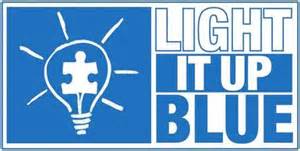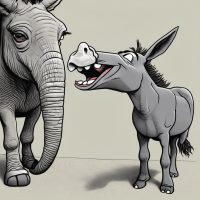Because so many people in my family are on the autism spectrum, Ye Olde Blogge celebrates Autism Awareness Month every year by publishing at least one blog post about our experience with autism. These posts tend to be more personal than technical explaining and exploring my experience with autism. Look to the right-hand sidebar for links to autism related posts we’ve published over the years.
This year, I thought we’d try and do several posts starting with this brief explainer of what autism is. Peruse the post and follow the links to find out more about autism.
What is Autism?
Autism is the commonly used term to refer to autism spectrum disorder which encompasses a wide range of developmental differences affecting communication and social skills. It is a spectrum because it has a wide range in the behaviors and mental processes it affects. At one end of the spectrum are the non-verbal individuals who must be cared for 24 hours a day to the very capable individuals who can have very successful careers. In between you folks like Raymond in Rain Man who has very few social skills and limited communication skills and Sheldon Cooper of Big Bang Theory who has a successful career in spite of his minor social and communication deficits.
It’s developmental because its first symptoms are evident in the first few years of life and those with it tend to lag behind their peers in meeting certain developmental milestones like walking but may jump ahead with others like reading.
From Awareness to Acceptance
In the US, the Autism Society designates April as Autism Awareness Month. This is the month where communities promote awareness of autism and community resources. This year they are shifting from awareness to acceptance of autism so that we think of it less as a disability and more as a different way of looking at the world. As much as Greta Thunberg wants it to be a superpower, it isn’t and it can’t be, not any more than not being autistic is a superpower. Somethings people with autism can do better than others, somethings, worse, and vice versa. Given that the world is designed for everyone who doesn’t have autism, it can be a painful experience to have it. If it weren’t, we wouldn’t have unemployment rates of 80% or so for people with autism.
Another reason to promote acceptance of autism is its prevalence. It seems that it is becoming increasingly prevalent in modern wealthier countries. In the US it is estimated that one eight year-old child in 54 has autism. To put that in perspective, it is about three and half million Americans living with autism. It has increased from about one in 150 people in 2000 to one in 68 in 2010 to one in 54 now. That’s an increase of 119%! Wow!
One of the things that is driving the acceptance of autism is the large number of TV shows and movies that have autistic characters and that we now have celebrities like Greta Thunberg or Temple Grandin. As much as people with autism chafe about the stereotypical representation that Sheldon Cooper portrays of autistic people, it helps non-autistic people become more habituated to the notion of having autistic people around and making it all more acceptable.
High Functioning Autism or Asperger’s Syndrome
The problem with autism, though, is that people on the spectrum have difficulty communicating and in social situations. It means that they can really rub people the wrong way without meaning to or even being aware that they are. Let’s run through a few signs and symptoms of autism so you might could recognize a friend, neighbor, or co-worker who is autistic. We’re talking high functioning autism here, what used to be called Asperger’s Syndrome.
People at this end of the spectrum refer to neurotypical people versus neuroatypical. You might still hear the term aspie, too. Some of the typical signs and symptoms are
- Low levels of eye contact
- Idiosyncratic patterns of speaking: too loudly, monotone, mispronounced words, repeated phrases, using movie quotes to communicate, and other oddities in spoken communication
- Difficulties understanding subtlety like sarcasm, irony, or other humor
- Shyness, aloofness, or awkwardness in social situations
- Obsessive interests in one or two topics. I had a friend who knew the armor thicknesses of every tank developed in World War II. Impressive, but hardly scintillating conversation.
- Clumsy or physically awkward
Because people with autism are different, many people will react by ostracizing them further or making fun of them. It is a perfectly normal human response to someone who breaks the norms of society, which, autistic people do by definition. It takes effort to overcome that knee-jerk reaction. You may need to help your friends, neighbors, or co-workers recognize this all-too-human reaction and get over it.
Categories: Autism




















Reblogged this on cabbagesandkings524 and commented:
Calico Jack – Autism
LikeLiked by 2 people
Good reminder
LikeLiked by 2 people